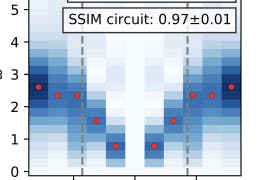Extracting the spin excitation spectrum of a fermionic system using a quantum processor

Understanding low-energy excitations in fermionic systems is crucial for their characterization. They determine the response of the system to external weak perturbations, its dynamical correlation functions, and provide mechanisms for the emergence of exotic phases of matter. In this work, we study the spin excitation spectra of the 1D Fermi-Hubbard model using a digital quantum processor. Introducing a protocol that is naturally suited for simulation on quantum computers, we recover the retarded spin Green's function from the time evolution of simple observables after a specific quantum quench. We exploit the robustness of the protocol to perturbations of the initial state to minimize the quantum resources required for the initial state preparation, and to allocate the majority of them to a Trotterized time-dynamics simulation. This, combined with the intrinsic resilience to noise of the protocol, allows us to accurately reconstruct the spin excitation spectrum for large instances of the 1D Fermi-Hubbard model without making use of expensive error mitigation techniques, using up to 30 qubits of an IBM Heron r2 device.

